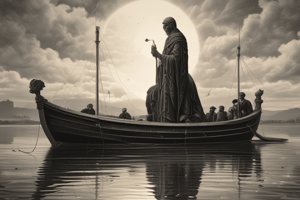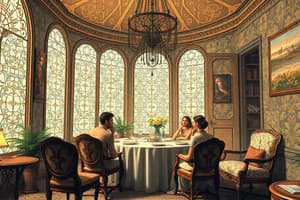Podcast
Questions and Answers
What event in 1960 significantly influenced resistance to apartheid in South Africa?
What event in 1960 significantly influenced resistance to apartheid in South Africa?
- Sharpeville Massacre (correct)
- Formation of the Black Consciousness Movement
- Establishment of the Polly Street Art Centre
- Soweto Uprisings
Which art centre was established first and had a significant impact in Johannesburg during the 1950s?
Which art centre was established first and had a significant impact in Johannesburg during the 1950s?
- Polly Street Art Centre (correct)
- The ELC Art Centre
- Rorke's Drift Art Centre
- Black Consciousness Centre
What was a key focus of Rorke's Drift Art Centre compared to Polly Street Art Centre?
What was a key focus of Rorke's Drift Art Centre compared to Polly Street Art Centre?
- Commercial art production
- Exclusively male artists
- Urban art development
- Connection to Africa (correct)
Who was a notable figure associated with the Black Consciousness Movement?
Who was a notable figure associated with the Black Consciousness Movement?
What factor predominantly characterized the Polly Street Art Centre during the 1950s?
What factor predominantly characterized the Polly Street Art Centre during the 1950s?
What style is often associated with Durant Sihlali's work?
What style is often associated with Durant Sihlali's work?
What does the act of reaching out in the artwork symbolize?
What does the act of reaching out in the artwork symbolize?
Which of the following mediums did Ephraim Ngatane NOT use?
Which of the following mediums did Ephraim Ngatane NOT use?
What characteristic defines the Neo-African style of art?
What characteristic defines the Neo-African style of art?
How does the artist incorporate his identity within the artwork?
How does the artist incorporate his identity within the artwork?
In which year did Ephraim Ngatane create 'Musicians'?
In which year did Ephraim Ngatane create 'Musicians'?
Which element is primarily used to symbolize unity in the artwork?
Which element is primarily used to symbolize unity in the artwork?
Durant Sihlali often documented what kind of realities in his art?
Durant Sihlali often documented what kind of realities in his art?
What does the decorative pattern and stylized robe indicate about the artwork?
What does the decorative pattern and stylized robe indicate about the artwork?
What type of artwork became famous at Polly Street alongside sculpture?
What type of artwork became famous at Polly Street alongside sculpture?
What role does the political and social context play in the artist's work?
What role does the political and social context play in the artist's work?
Which of the following is NOT a work created by Ephraim Ngatane?
Which of the following is NOT a work created by Ephraim Ngatane?
What did Skotnes begin to collect that influenced his art style?
What did Skotnes begin to collect that influenced his art style?
What was the main purpose of the ELC Art and Craft Centre in Rorke's Drift?
What was the main purpose of the ELC Art and Craft Centre in Rorke's Drift?
Who were the founders of the ELC Art and Craft Centre?
Who were the founders of the ELC Art and Craft Centre?
What was one key financial aspect of the ELC Art and Craft Centre?
What was one key financial aspect of the ELC Art and Craft Centre?
What significant event occurred at Rorke’s Drift in 1982?
What significant event occurred at Rorke’s Drift in 1982?
What kind of artistic influence was fostered at the ELC Art and Craft Centre?
What kind of artistic influence was fostered at the ELC Art and Craft Centre?
What was the significance of the interaction between the school and workshops at the ELC Art and Craft Centre?
What was the significance of the interaction between the school and workshops at the ELC Art and Craft Centre?
Which gender predominantly practiced weaving at Rorke’s Drift?
Which gender predominantly practiced weaving at Rorke’s Drift?
Why was the establishment of the ELC Art and Craft Centre necessary after the closure of Polly Street Art Centre?
Why was the establishment of the ELC Art and Craft Centre necessary after the closure of Polly Street Art Centre?
What distinctive technique did men use in the ceramic workshop?
What distinctive technique did men use in the ceramic workshop?
Which artist is known for producing work that includes text and reflects personal reality?
Which artist is known for producing work that includes text and reflects personal reality?
What impact did graduates of the ELC Art and Craft Centre have on the local art environment?
What impact did graduates of the ELC Art and Craft Centre have on the local art environment?
What was a significant influence on Azaria Mbatha's artwork?
What was a significant influence on Azaria Mbatha's artwork?
What broader societal issue does the content highlight regarding human oppression?
What broader societal issue does the content highlight regarding human oppression?
Where was John Muafangejo born?
Where was John Muafangejo born?
What themes are primarily found in Azaria Mbatha’s artwork?
What themes are primarily found in Azaria Mbatha’s artwork?
Who assisted John Muafangejo with his application to Rorke's Drift?
Who assisted John Muafangejo with his application to Rorke's Drift?
Study Notes
Resistance Art in South Africa
- Resistance art emerged in South Africa during the apartheid era (1950-1994), a period of racial segregation and oppression.
- The Nationalist Government suppressed any form of protest or dissent.
- In 1960, the Sharpeville Massacre saw 69 people shot by police during a peaceful anti-apartheid demonstration.
- The Soweto Uprisings in 1976 were a series of student protests against Afrikaans as the language of instruction in schools.
- The Black Consciousness Movement, founded by Steve Biko, emerged as a significant force against apartheid.
Early South African Art
- The first half of the 20th century (1900-1950) lacked dedicated art schools or training centers for artists of color.
- Self-taught artists were the norm.
- Two crucial art centers emerged during this period, offering access to art and craft education: Polly Street Art Centre and Rorke's Drift.
Polly Street Art Center
- Founded in 1949 in Johannesburg by a liberal city council.
- Aimed to provide a recreational space for working men in the evenings.
- Dominated by male artists.
- The center fostered a "romantic re-connection to Africa" through its art.
Rorke's Drift
- Located in KwaZulu-Natal.
- Founded in 1963 by the Swedish Lutheran Mission in South Africa.
- Funded and supported by the Mission.
- A prominent role was assigned to women artists.
- The center emphasized a direct "connection IN Africa."
Durant Sihlali
- His art is often categorized as "township art," but it deeply reflects historical realities.
- He used impressionist techniques in his work.
- Notable works:
- "Burning old clothes" (1964)
- "Street vendors, Kliptown" (1980)
- "Pimville rent offices on fire, riots (Soweto) 1977"
Ephraim Ngatane
- A prominent artist associated with Polly Street.
- Focused on depicting township scenes.
- Utilized watercolors, gouache, oils, and ink.
- Famous works:
- "Musicians" (1967)
- "Reading the Newspaper" (1969)
- "Figures in a township" (1969)
- "Reflections of Soweto" (1970)
- "The Bridal Procession" (1962)
Neo-African Style
- Artists began to move away from traditional Western art forms, choosing more simplified and distorted representations.
- Cecil Skotnes, a significant artist at Polly Street, played a crucial role in this development.
- He collected African art and incorporated it into his own work.
- Skotnes' style emphasized the harsh realities of oppression and the absurdity of apartheid.
- His work aimed to draw attention to the injustices and violence experienced under apartheid.
Rorke's Drift Art & Craft Centre
- Founded in 1962 by Swedish missionaries Peder and Ulla Gowenius.
- Established as an extension of a Swedish committee dedicated to promoting African art and craft.
- Operated from the Ceza Mission Hospital in South Africa.
- Benefited from financial support and marketing by the Swedes.
- The center emphasized nurturing African artistic heritage and fostering cross-cultural exchange.
- It aimed to create a balance between traditional and modern art forms.
- ELC graduates were guaranteed employment opportunities at other art centers throughout the country.
Artistry at Rorke's Drift
- The center emphasized a close connection between Fine Art and craft workshops.
- The interaction between these areas is a unique aspect of South African art.
- Craft practices were typically divided by gender:
- Weaving: Primarily by women
- Fine Art: Primarily by men
- Ceramics: Both men and women participated, but women favored coil techniques, while men utilized the kick-wheel.
Azaria Mbatha
- Influenced by his Christian Zulu upbringing.
- Notable works:
- "Jesus After Death"— features Christian imagery and symbolism
- Themes:
- Unity
- Reconciliation
- Christian imagery
- Universal experience
John Muafangejo
- Born in Ovamboland, South-West Africa (now Namibia)
- His family adhered to Lutheran Christianity, retaining their cultural traditions.
- He was a skilled linocut artist—the first Namibian artist to achieve international recognition.
- He was influenced by Mbatha and the Rorke's Drift environment.
- His work integrates text, reality, and his strong Christian faith.
- He aimed to represent the social and environmental realities of his life, particularly the Church's role in resisting apartheid.
- His work often featured symbolism, such as the "reaching out" (unity and marriage), and patterns signifying Ovambo heritage.
- He incorporated Christian imagery into his artworks, reinterpreting traditional narratives.
- His signature style included decorative patterns, African-like zig-zag lines, and a bold use of black and white contrast.
Studying That Suits You
Use AI to generate personalized quizzes and flashcards to suit your learning preferences.
Related Documents
Description
This quiz explores the significant role of resistance art during the apartheid era in South Africa. It covers key events, movements, and art centers that shaped the artistic landscape from 1950 to 1994. Test your knowledge on the artists, protests, and cultural evolution of this critical period in history.




